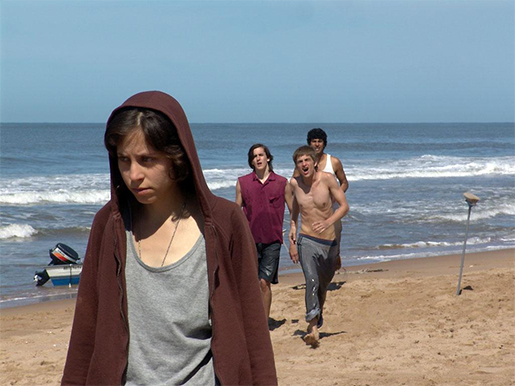Movie Review: XXY (2008)
![]()
What Is There Between Him and Her and/or Him?
Adolescence is a trial no matter what gender one is. The conflict can be so crippling that it damages and ultimately defines one as an adult. There have been many films, some good, about experiencing teenage angst and the need to break free or remain grounded. Either way can produce regret later in life. This film XXY has tread new ground by presenting a teenager whose entire identity, both internally and anatomically, is unusual to a majority of people. Funnily enough, the uniqueness of this case makes the experience all the more universal. The teenager is named Alex and is fifteen years old. Alex has a choice this summer that boggles one’s mind toward fantasy. The choice is whether Alex should resume the rest of life as male or female.
Alex is a hermaphrodite. Alex looks like a teenage girl but possesses the make-up of a boy that he/she has deluded with pills of estrogen. Alex is cared for by her parents Kraken (brilliantly played by Ricardo Darín) and Suli (Valeria Bertuccelli) who live, for their child’s sake, in a wooden turquoise cabin near the seaside in Uruguay after moving from Argentina. Her father works as an oceanographer who possesses a protectiveness, even for the wounded sea turtles he studies. The key for observing this challenging and brave film is by possessing the empathy that Kraken has. He is quiet, smart, unobtrusive, and lashes out only when someone endangers his child. Rarely has a father been portrayed on film with such loveliness.
There is an astonishing sequence late at night where Kraken seeks out a frank older man who presents pictures of himself as a child — pictures of girl! Kraken listens calmly and curiously to the difficult experiences of this struggling hermaphrodite. He is so involved with understanding his “daughter” that he is simply removed from prejudice: “Making her afraid of her body is the worst thing you can do to a child”. This character was so easy for me to gravitate towards.
 Inés Efron portrays Alex with bravado and great vulnerability. She instinctively performs her character’s struggle with tendencies ruled by her intersex. Alex’s struggle is made more difficult by the arrival of Ramiro (Germán Palacios), his wife Erica (Carolina Pelleritti), and their teenage son Alvaro (Martín Piroyansky). Ramiro is a trusted surgeon who has been invited over, whether Kraken and Suli decide to inform him at all, to perform corrective sex surgery in secret. Alvaro and Alex form a fragile friendship as their lazy days on beach pass by. The dialogue between the two teenagers is startlingly frank:
Inés Efron portrays Alex with bravado and great vulnerability. She instinctively performs her character’s struggle with tendencies ruled by her intersex. Alex’s struggle is made more difficult by the arrival of Ramiro (Germán Palacios), his wife Erica (Carolina Pelleritti), and their teenage son Alvaro (Martín Piroyansky). Ramiro is a trusted surgeon who has been invited over, whether Kraken and Suli decide to inform him at all, to perform corrective sex surgery in secret. Alvaro and Alex form a fragile friendship as their lazy days on beach pass by. The dialogue between the two teenagers is startlingly frank:
Alex: “I’ve never fucked anyone. Want to now?”
Alvaro: “With who?”
Alex: “With me.”
Alvaro: “You’re too young.”
Alex: “I’m only fifteen.”

Eventually there is a confrontation midway into the film where Alvaro and Alex are caught up in one another’s sexual crisis. They are compelled by their need to connect with each other as well as their own confused and highly guarded urges. For anyone who felt uneasy watching the emotionally mature Brokeback Mountain (2006), will probably suffer a Scanners moment when they witness how the tables turn. The tone of the picture achieves the right balance of sentimentality and a hardened sense of reality. The characters are well rounded and respond realistically to their circumstances. They remain true to their human nature. Rawness is ubiquitous. The nakedness of the performers both emotionally and viscerally approaches the tact of Cathrine Breillat’s brilliant Fat Girl (2001).
Natasha Braier’s desaturated cinematography and its conscious color palette throughout the film is very effective. The picture ranges from black shadows and rich sepia hues at night to the daylight’s gray roads, near white sand, harsh blue sky with occasional splashes of green foliage. The main titles takes place underwater where strange alien-like creatures pulsate and blow bubbles amongst the web-like reefs. The intimidating tone of the film is more creepy than most of the generic suspense thrillers that came out this year. The music by Andrés Goldstein and Daniel Tarrab complements the atmosphere by being subtly somber.
 This film, winner of the Critics Week Grand Prize at Cannes 2007, marks the directorial debut of Lucía Puenzo, daughter of Luis Puenzo (Oscar nominee The Official History, 1986). She adapted her screenplay from the short story Cinismo by Sergio Bizzio. After much writing for TV and feature films, Puenzo arrives fully formed as a consummate and visceral storyteller. How the characters deal with the aftermaths and revelations of their actions are executed without negligence while maintaining some ambiguity that they are reasonably unable to capture at that age. Somehow, Puenzo’s film bares resemblance to Kimberly Peirce’s searing Boys Don’t Cry (1999) and achieving a niche of its own.
This film, winner of the Critics Week Grand Prize at Cannes 2007, marks the directorial debut of Lucía Puenzo, daughter of Luis Puenzo (Oscar nominee The Official History, 1986). She adapted her screenplay from the short story Cinismo by Sergio Bizzio. After much writing for TV and feature films, Puenzo arrives fully formed as a consummate and visceral storyteller. How the characters deal with the aftermaths and revelations of their actions are executed without negligence while maintaining some ambiguity that they are reasonably unable to capture at that age. Somehow, Puenzo’s film bares resemblance to Kimberly Peirce’s searing Boys Don’t Cry (1999) and achieving a niche of its own.
This is one of the best films of the year.
XXY (2008) Trailer

© 2008 – 2024, CINELATION | Movie Reviews by Chris Beaubien. All rights reserved.


















